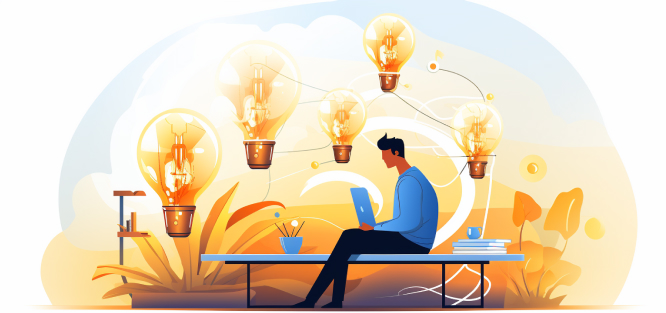So the last critical element I'm going to cover today is called "Normalizing Challenges" which is a very profitable one when you execute it correctly.
We already know that most of you here on the line today have -- at some point -- invested in a product, program or course and not completed it for whatever reason.
Let me know if the experience I'm about to describe resonates in any way, shape or form.
The marketing for the program made you believe that everything was going to be awesome. In fact, they told you it was going to be "push button" easy. So you get into it, and surprise!
It didn't turn out to be as simple or as easy as all that. Perhaps you start to feel "behind" in your coursework. Or perhaps it just starts to feel a little overwhelming or difficult. So you start to feel a little... inadequate. I mean, this was supposed to be "easy" right?
Before you know it, you've begun comparing yourself to others... which made you feel even worse. And -- before too long -- your inner voice is screaming "what's wrong with me?" and you just want those negative feelings to go away... wouldn't it be easier to just give up and return to the way things were before you signed up?
I know I've certainly experienced this. What about you?
Obviously, life isn't a video game. And none of us are starting fresh, with zero points.
Your customers have past experiences and failures that will color how they approach your product... And -- if you don't acknowledge, label and address their fears, doubts, and concerns on the journey from Mission to Mission Accomplished -- then chances are good that they'll take themselves out of the game before they see results.
As a product creator, before I discovered the Experience Formula, this was happening to most of my students too. In fact, I watched the vast majority of my students struggle, hit internal resistance, disengage, and then give up.
And when I talked with my colleagues and peers, they were seeing the same thing happening in their businesses too.
A lot of them actually believed that some people just aren't meant to succeed. They said "if people really wanted success, they'd figure out a way."
And while I understood where they were coming from, I still felt deeply conflicted about marketing and selling products that didn't consistently deliver real transformation...
In an industry where the average failure rate hovers at over 90%, I honestly don't think the entire problem lies with the student. While we can't take responsibility for their success, we need to be responsible to them...
So, Core Experience #5, "Normalizing Challenges" is where you prepare your students, clients and customers for the challenges they'll face when they set down the road from Mission to Mission Accomplished, so they're prepared for the freak-outs and not blindsided by them.
And I'm not talking about some measley paragraph in your welcome email reminding them that -- if things get hard -- to just hang in there.
I'm talking about a consistent and constant focus on where your students' heads might be at, at each stage of their journey toward Mission Accomplished.
According to most mainstream psychology theory, we're actually so attached to our past actions and current identity that, when we're faced with a choice to take action that could change things we have an internal "are-you-sure", freak out moment. (Even if it could change things for the better, and that's actually where the infamous "scared of success" theory comes from.)
It's neither good nor bad. It's just our brain trying to keep us nice & safe, keeping our reality the same today as it was yesterday, because that's working out just fine so far, right?
I mean we're still alive. We're still breathing. We're still here.
So -- for each and every single step in your program, ask yourself, what are the challenges someone might have as they take this action?
What do they need to believe about themselves to be able to take this action?
What fears or self-doubts could kick in as they do what you're asking them to do?
You take all of this, and you deal with them inside your program.
When you address them, when you name them, you "normalize" them for people which makes whatever feelings, challenges or fear coming up OK for them. And when people know that they're normal and that everyone goes through these challenges, they'll start to feel less like they're failing.
And by doing that you help them avoid the shame and emotional disengagement most people feel when they're not meeting their own expectations.
After all, unlike games, we're not in the business of escapism here. We're in the business of helping people reach "escape velocity" so they can create something new for themselves and their lives.
That's not easy. And we need to address that in our programs in the right way so our students, clients and customers are as prepared as they can be for what's to come.
For example, I know from experience what a huge step it is to make the choice to create a product... and I know how scary it can feel...
I remember when my husband Murray popped the question... we were hiking in the Santa Monica Mountains to the Hollywood sign on a hot summer day when he turned to me and popped the question.
Not the one you're thinking...
He asked me: "Marisa, why don't you create an online program?" I was drowning in my service-based business and he wanted to spend more time with me so he thought if I created a program I could get out of working with people 1:1, leverage my time and make more money...
But the first words out of my mouth were: "Who would want to learn from me?" Followed quickly by: "What could I even offer?"
The irony is that we were hiking to the Hollywood sign -- that symbol of fame and fortune. And even though I was within spitting distance of that iconic sign, inside I felt far from successful.
Eventually -- with a lot of prodding from Murray -- I worked up the courage to create my first online program and I sold...
Zip. Zero. Zilch.
I just didn't get it... It was such good stuff. Why weren't people buying?
So I did what any self-respecting entrepreneur would do...
I created another program. This one did better... I sold a handful -- not a lot but some... that was the product I told you about at the start of this Masterclass...
Now if you're thinking that people should just "get over it and take action despite it all," I'd like to invite you to do what I just did and think back to a moment in your life when you didn't take the action you wanted to and why. What was the challenge that blindsided you and took you out? And I want you to imagine what life might have been like if you HAD taken that action instead?
Really understanding in advance the challenges and how your customers should deal with them can literally be the difference that some students need to bounce back and keep going.
And if this has never happened to you -- congratulations, you're one of the 1% percent of people who are able to take action and transform their lives fearlessly and without any internal resistance showing up.
And if that really is you, then your job is to be humble and try to help the other 99% who aren't like you.
I'm normalizing challenges constantly in my programs, and whenever I wonder if I'm overdoing it, I get a reminder that it's a critical part of my job.
EPM student Patti Kessler told me: "Normalizing the challenges helped me move through self-judgment and find compassion for myself with love."
Would she have made it through if I hadn't put so much focus on it? Who knows. But it didn't hurt, and here she is, able to write me a lovely testimonial, and she's actually come back to buy more from me since then too.
I can't tell you how many students we've kept moving thanks to normalizing challenges. Is it worth it? You tell me.
We have over 650 pages of testimonials for this program and the one that warms my heart the most is this one from Jennifer Holbus...
My biggest aha moment was when I received a "personal" email with an incentive to get caught up. I didn't jump 20 points for the t-shirt, I did it because someone cared that I was falling behind. This is where the dozens of my other courses would have ended for me. Thank you so much for the nudge to keep going.
This is what normalizing challenges looks like...
That one prompt lead Jennifer from being on the brink of dropping out to earning $100K during the 10-weeks of the program and another $150K shortly thereafter... so she went from zero to a quarter-million dollars just because we cared enough to each out.
Are you seeing just how different it is to go through an experience product, rather than a traditional info product, program or course? And can you see how much an experience product can change your business?




